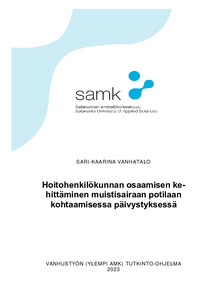Hoitohenkilökunnan osaamisen kehittäminen muistisairaan potilaan kohtaamisessa päivystyksessä
Vanhatalo, Sari-Kaarina (2023)
Vanhatalo, Sari-Kaarina
2023
All rights reserved. This publication is copyrighted. You may download, display and print it for Your own personal use. Commercial use is prohibited.
Julkaisun pysyvä osoite on
https://urn.fi/URN:NBN:fi:amk-2023113032905
https://urn.fi/URN:NBN:fi:amk-2023113032905
Tiivistelmä
Ikääntyneiden osuus maamme väestöstä on kasvava. Väestön vanheneminen edellyttää terveydenhuollon palvelurakenteiden muutostarpeiden huomiointia ja iäkkäisiin kohdistuvien asenteiden tarkastelua. Päivystys hoitoympäristönä on usein levoton ja hälyinen. Iäkkäälle muistisairaalle päivystys voi olla pelottava ja ahdistava paikka, johon hän on äkkiarvaamatta ohjautunut. Päivystysympäristö voi laukaista tai lisätä iäkkään muistisairaan käytösoireita tai heikentää hänen terveydentilaansa jo lyhyellä ajalla merkittävästi.
Opinnäytetyön aiheena oli hoitohenkilökunnan osaamisen kehittäminen muistisairaan potilaan kohtaamisessa päivystyksessä. Kehittämismenetelmänä oli konstruktiivinen tutkimusmenetelmä. Opinnäytetyön tavoitteena oli kehittää muistisairaan potilaan hoitoa päivystyksessä. Tarkoituksena oli sekä kartoittaa hoitohenkilökunnan kokemia haasteellisia tilanteita muistisairaan potilaan kohtaamisessa päivystyksessä, että heidän arvioitaan omasta osaamisestaan kohdata muistisairas. Aineisto kerättiin sähköisellä kyselylomakkeella. Kyselytutkimus lähetettiin päivystyksen hoitohenkilökunnalle (N=113). Kyselyn vastausprosentti oli 41 (n=46).
Kyselytutkimuksessa ilmeni, että päivystyksen hoitohenkilökunta kohtaa muistisairaita potilaita työssään usein. Yleisimmiksi haasteellisen käyttäytymisen muodoiksi koettiin muistisairaan levottomuus, rauhattomuus, toistuva kyseleminen ja pyyteleminen sekä jatkuva lähdössä oleminen. Hoitohenkilökunnan omat arviot osaamisestaan keskittyivät asteikon keskivaiheille asteikolla 1–10. Kyselytutkimuksen vastauksista rakentui osa-alueita liittyen hoitohenkilökunnan osaamiseen, päivystyksen fyysiseen ympäristöön ja johtamiseen.
Tässä opinnäytetyössä konstruktiona tuotettiin osaamisen kehittämissuunnitelma päivystykseen. The proportion of elderly people in the population of our country is growing. The population getting older requires the need for change in the structures of the health care services to be reviewed. The emergency room is a hectic and noisy space for caretaking. The emergency room can be a scary and anxiety inducing place for an elderly person suffering from a memory disorder, where they have ended up all of a sudden. The space can set off or add onto the behavioral symptoms of a memory disordered person or make their state of health significantly worse, even over a short amount of time.
The topic of the thesis was developing the knowledge of caretakers in encountering a memory disordered person in the emergency room. The development method was the constructive research method. The aim of the thesis was to develop and better the care of a memory disordered person in the emergency room. It aimed to survey both the difficult situations the caretakers face in facing a memory disordered person in the emergency room and their own estimates in their know-how in encountering a memory disordered person. The material was gathered with an electronic questionnaire. The questionnaire was sent to the emergency room staff (N=113). The percentage of answers was 41%(n=46).
The questionnaire showed that the ER staff encounters memory disordered people regularly in their work. The most usual behavioral difficulties of the memory disordered patients were thought to be the restlessness, frequent questions and asking for something and the frequent urges to leave. The caretaking staff estimated their skills to be in the middle of the scale, it being from 1 to 10.
The answers of the questionnaire formed areas
adjacent to the skills of the caretaking staff, the physical space of the emergency room and the management. In this thesis the construction was a skill-developing plan for the emergency room.
Opinnäytetyön aiheena oli hoitohenkilökunnan osaamisen kehittäminen muistisairaan potilaan kohtaamisessa päivystyksessä. Kehittämismenetelmänä oli konstruktiivinen tutkimusmenetelmä. Opinnäytetyön tavoitteena oli kehittää muistisairaan potilaan hoitoa päivystyksessä. Tarkoituksena oli sekä kartoittaa hoitohenkilökunnan kokemia haasteellisia tilanteita muistisairaan potilaan kohtaamisessa päivystyksessä, että heidän arvioitaan omasta osaamisestaan kohdata muistisairas. Aineisto kerättiin sähköisellä kyselylomakkeella. Kyselytutkimus lähetettiin päivystyksen hoitohenkilökunnalle (N=113). Kyselyn vastausprosentti oli 41 (n=46).
Kyselytutkimuksessa ilmeni, että päivystyksen hoitohenkilökunta kohtaa muistisairaita potilaita työssään usein. Yleisimmiksi haasteellisen käyttäytymisen muodoiksi koettiin muistisairaan levottomuus, rauhattomuus, toistuva kyseleminen ja pyyteleminen sekä jatkuva lähdössä oleminen. Hoitohenkilökunnan omat arviot osaamisestaan keskittyivät asteikon keskivaiheille asteikolla 1–10. Kyselytutkimuksen vastauksista rakentui osa-alueita liittyen hoitohenkilökunnan osaamiseen, päivystyksen fyysiseen ympäristöön ja johtamiseen.
Tässä opinnäytetyössä konstruktiona tuotettiin osaamisen kehittämissuunnitelma päivystykseen.
The topic of the thesis was developing the knowledge of caretakers in encountering a memory disordered person in the emergency room. The development method was the constructive research method. The aim of the thesis was to develop and better the care of a memory disordered person in the emergency room. It aimed to survey both the difficult situations the caretakers face in facing a memory disordered person in the emergency room and their own estimates in their know-how in encountering a memory disordered person. The material was gathered with an electronic questionnaire. The questionnaire was sent to the emergency room staff (N=113). The percentage of answers was 41%(n=46).
The questionnaire showed that the ER staff encounters memory disordered people regularly in their work. The most usual behavioral difficulties of the memory disordered patients were thought to be the restlessness, frequent questions and asking for something and the frequent urges to leave. The caretaking staff estimated their skills to be in the middle of the scale, it being from 1 to 10.
The answers of the questionnaire formed areas
adjacent to the skills of the caretaking staff, the physical space of the emergency room and the management. In this thesis the construction was a skill-developing plan for the emergency room.
